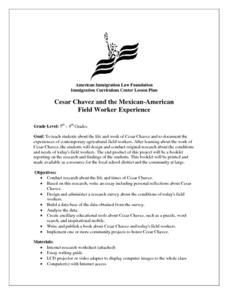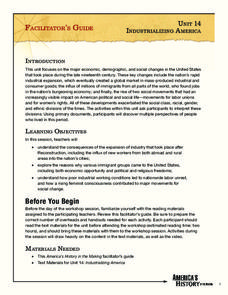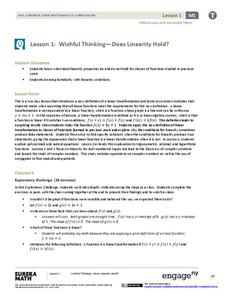PBS
Remembering Nelson Mandela
To learn more about Nelson Mandela, young historians watch a 20 minute video that traces his life from boyhood in a small South African village, to his work as an activist opposed to Apartheid, his imprisonment, and to his leadership as...
American Immigration Law Foundation
Cesar Chavez and the Mexican-American Field Worker Experience
After researching and learning about the work of Cesar Chavez, your young historians will design a booklet on the conditions and needs of today's field workers and the Mexican-American field worker experience.
Alabama Department of Archives and History
Runaway Slaves in Alabama: Individual Freedom Fighters in the 1800s
Class pairs examine eight runaway slave advertisements from the mid-1800s to develop an understanding of the conditions slaves faced and of race relations.
Constitutional Rights Foundation
Automation and the American Worker
A thought-provoking resource examines the future of automation and the effects on employment. Academics read informational text, complete written prompts, and participate in activities to understand automation and the possibilities for...
EngageNY
Grade 9 ELA Module 4, Unit 1, Lesson 8
In a close reading of "The Overseer" chapter from Sugar Changed the World, groups focus on the words Aronson and Budhos use to contrast the lifestyles of enslaved people and their enslavers. The whole class then engages in an...
EngageNY
Grade 9 ELA Module 4, Unit 1, Lesson 13
Class members conclude their reading of the supplemental text, “Bangladesh Factory Collapse: Who Really Pays for our Cheap Clothes?” and use the provided Evaluating Argument and Evidence Tool to analyze the evidence Anna McMullen uses to...
EngageNY
Grade 9 ELA Module 4, Unit 1, Lesson 10
What can consumers do to pressure companies to produce "ethically manufactured goods"? Readers examine the evidence Amy Odell uses in the supplemental text "How Your Addiction to Fast Fashion Kills" to support her argument and her...
EngageNY
Launching Lyddie
Pupils engage in a close reading of chapter one of Katherine Paterson's novel, Lyddie. After answering text-dependent questions based on their reading, they complete reader's notes about how the setting, characters, and plot interact.
EngageNY
Forming Evidence-Based Claims: Should Lyddie Sign the Petition?
Pupils reread selected passages from Katherine Paterson's novel Lyddie. After they finish, individuals gather textual evidence supporting whether Lyddie should sign a controversial petition and record their findings on graphic organizers.
EngageNY
Reading Closely and Introducing Rhetoric Toolbox: Unions as Agents of Change—Part 1
Scholars explore the question of whether labor unions are the agents of change as they continue reading César Chávez's 1984 speech, "Address to the Commonwealth Club of California." They discuss rhetoric in Chávez's speech and discover...
EngageNY
Mid-Unit Assessment: How Chávez Develops His Claims in the Commonwealth Club Address
Scholars complete a mid-unit 2 assessment, analyzing how César Chávez supports his claims in his 1984 speech, "Address to the Commonwealth Club of California." Learners focus on paragraphs 18 and 19 of the speech, answering text-based...
Curated OER
Approaching Equilibrium
Contrary to a common popular belief, equilibrium does not mean a reaction has stopped. An interesting presentation covers reactant concentrations and product concentrations. It describes the equilibrium as when the forward rate equals...
Institute of Electrical and Electronics Engineers
Get it Write
In an effort to practice engineering design, STEM classes break out into teams and endeavor to make a working ink pen. To prepare, they read about writing implements through history, patents, and viscosity of liquids. Armed with this...
National Library of Medicine
Your Environment, Your Health: Air Quality
Some scientists argue that air pollution now causes more deaths than smoking. The second unit in a six-part series focuses on air quality. Scholars learn what's in the air, how clean the air around their school is, and what they can do...
Texas Center for Learning Disabilities
Chapter 4 Teacher Guide and Student Log
"Piano Lessons," the fourth chapter in Tony Johnston's Any Small Goodness: A Novel of the Barrio provides an opportunity for class members to work in their study teams to develop and answer Level 1, Right There questions about the novel.
National Energy Education Development Project
Introduction to Wind Energy
The U.S. produced enough wind energy in 2015 to power all of the homes in Alaska, California, Delaware, the District of Columbia, Hawaii, Idaho, Maine, Montana, Nebraska, New Hampshire, North Dakota, Rhode Island, South Dakota, and...
Roy Rosenzweig Center for History and New Media
Slaves and Indentured Servants
In theory, at least, indentured servitude and slavery were two different practices in the American colonies. Class groups conduct a close reading of two primary source documents, one written by a slave and one by an indentured servant,...
Annenberg Foundation
Industrializing America
Imagine an eight year old spindle boy working barefoot in a factory in the late 1800s. Scholars research the industrial period in American history in the 14th lesson of a 22-part series that explores the country's background. Groups...
EngageNY
Wishful Thinking—Does Linearity Hold? (Part 1)
Not all linear functions are linear transformations — show your class the difference. The first lesson in a unit on linear transformations and complex numbers that spans 32 segments introduces the concept of linear transformations and...
iCivics
Conflict & Cooperation
Considering such conflicts as the Vietnam War and the war in Afghanistan, what motivates nations to cooperate? Your class members will analyze past and current international events in order to understand the types of conditions and...
Teach Engineering
A Good Foundation
It takes a strong foundation to build a house and a stronger one for a bridge. This resource presents the effects of geology and soil on bridge foundations. Working in groups, the class investigates the interaction of shallow and deep...
National Endowment for the Humanities
Tales of the Supernatural
Scary stuff! Whether approached as the first horror story or a "serious imaginative exploration of the human condition," Frankenstein continues to engage readers. Here's a packet of activities that uses Mary Shelley's gothic novel to...
Syracuse University
American Industrial Revolution
While the Industrial Revolution may have fueled America's rise to the top of world markets, the child laborers often faced dangerous conditions. Using primary source images and other information, scholars consider what these children...
Atlanta History Center
Civil Disobedience and the Atlanta Student Movement
What tactics are used in civil disobedience? Learners study the conditions in Alabama that led to the establishment of the Atlanta Student Movement, as well as consider the nature and effectiveness of civil disobedience.
Other popular searches
- Working Conditions Today
- Unfair Working Conditions
- Poor Working Conditions
- Fair Working Conditions
- Immigrant Working Conditions

























